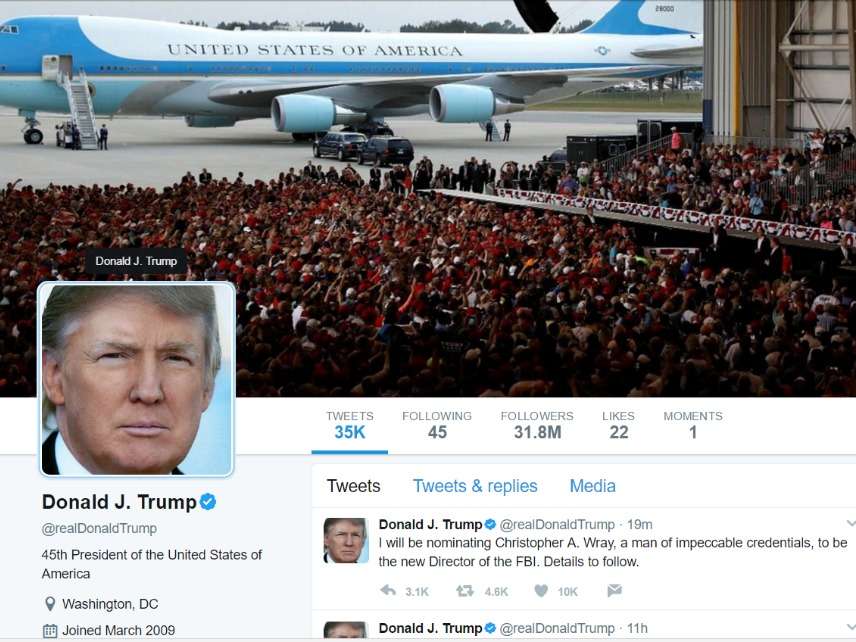Is There a First Amendment Right to Follow the President on Twitter?
Blocked Trump critics argue that his personal account is a "designated public forum" from which they cannot legally be excluded because of their views.

It will surprise no one familiar with Donald Trump's attitude toward criticism that people who make negative comments about him on Twitter may find their access to his account blocked. If Trump were an ordinary Twitter user, he would be well within his rights to shun anyone who offends him.
But Trump is not an ordinary Twitter user. He is the president of the United States, and he regularly uses his @realDonaldTrump account—which has about 32 million followers, 13 million more than the official @POTUS account—to trumpet his accomplishments, push his policies, attack his opponents, and complain about his press coverage.
In a letter they sent the president yesterday, lawyers for two blocked Trump critics argue that the way he uses his personal account makes it a "designated public forum," meaning that banishing people from it based on the opinions they express violates the First Amendment.
"This Twitter account operates as a 'designated public forum' for First Amendment purposes, and accordingly the viewpoint-based blocking of our clients is unconstitutional," write Jameel Jaffer and two of his colleagues at Columbia University's Knight First Amendment Institute. "We ask that you unblock them and any others who have been blocked for similar reasons….When the government makes a space available to the public at large for the purpose of expressive activity, it creates a public forum from which it may not constitutionally exclude individuals on the basis of viewpoint….The government may impose reasonable time, place, and manner restrictions in a designated public forum, but it may not exclude people simply because it disagrees with them."
Jaffer, formerly the deputy legal director of the American Civil Liberties Union, represents Holly O'Reilly (@AynRandPaulRyan) and Joe Papp (@joepabike), both of whom were recently cut off from @realDonaldTrump after writing disparaging tweets about the president.
On May 28, the day O'Reilly was blocked, she posted a GIF of Pope Francis glancing at Trump, then looking away with what looks like a troubled (or possibly exasperated) expression on his face. "This is pretty much how the whole world sees you," O'Reilly wrote. Last Saturday, Papp needled the president about a pro-Trump rally held near the White House that day: "Why didn't you attend your #PittsburghNotParis rally in DC, Sir? #fakeleader" The next day, Papp discovered he had been blocked.
Those were hardly the first negative comments about Trump from O'Reilly or Papp, and some of the earlier ones were less temperate. On May 16, responding to a presidential tweet urging investigation of "LEAKERS in the intelligence community," O'Reilly wrote, "YOU ARE THE LEAKER you moron. Shut your giant piehole and maybe we'll live to see another president." As Jaffer et al. note, "It is easy to understand why you and your advisers might have found our clients' posts to be disagreeable. Even if the posts were scornful and acerbic, however, they were protected by the First Amendment."
Even Trump would (I hope) concede that much. But he has not tried to censor or arrest people who say mean things about him on Twitter. Instead he has done the Twitter equivalent of sticking his fingers in his ears while chanting, "Nah nah nah. I can't hear you!"
In doing so, however, he has prevented O'Reilly, Papp, and other blocked users from following him, viewing his tweets while logged on to Twitter, using Twitter's search function to locate specific Trump tweets, sending direct messages to him, viewing the names of accounts he follows or that follow him, and directly participating in comment threads about his tweets. Thus these Trump critics have been effectively excluded from a designated public forum created by the president.
Or so say Jaffer and his colleagues. Others are less sure. "It's a novel and ambitious argument and certainly in the public interest, but also feels like a tough sell," Ken Paulson, president of the First Amendment Center, told The Wall Street Journal. "Is the president's Twitter account, established well before he was elected, a public forum where interactive free expression is expected or more like a newsletter, where the communication is all one way? I do think municipalities that establish Facebook pages and invite citizen input are in fact establishing public forums, but I'm not sure that Donald Trump's brief bursts of opinion are the same thing."
UCLA law professor Eugene Volokh likewise thinks the issue is not nearly as clear as Jaffer suggests. Volokh argues that @realDonaldTrump seems more like a personal project than a government program: "My inclination is to say that @RealDonaldTrump, an account that Trump began to use long before he became president, and one that is understood as expressing his own views—apparently in his own words and with his own typos—rather than some institutional position of the executive branch, would likely be seen as privately controlled, so that his blocking decisions wouldn't be constrained by the First Amendment."


Show Comments (107)